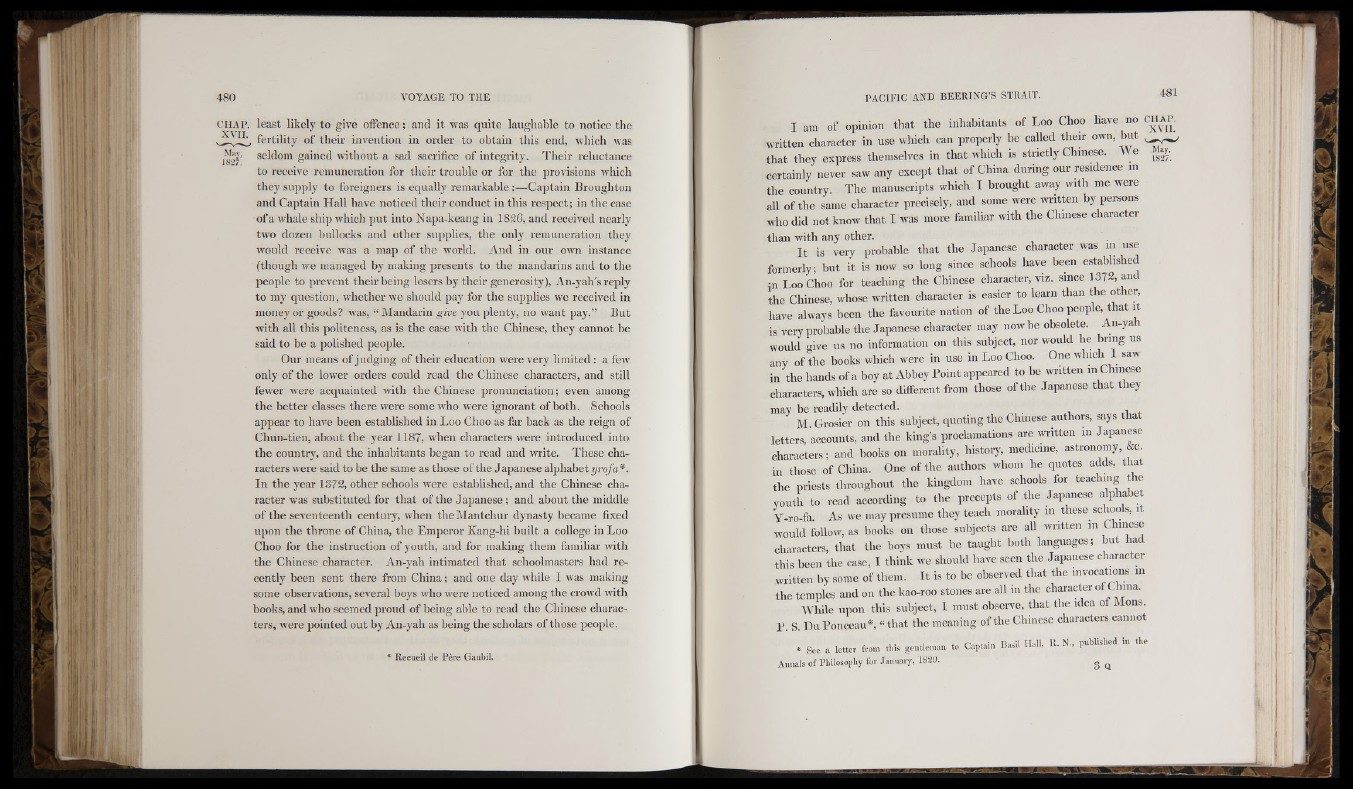
/ ; i
li I ; i
C H A P . least likely to give offence; and it was quite laughable to notice the
X V I I
Mav.
182?.
, fertility of tbeir invention in order to obtain tbis end, wbicb was
seldom gained without a sad sacrifice of integrity. Tbeir reluctance
to receive remuneration for tbeir trouble or for tbe provisions which
they supply to foreigners is equally remarkable:—Captain Broughton
and Captain Hall have noticed tbeir conduct in this respect; in tbe case
of a whale ship whicli put into N apa-keang in 1826, and received nearly
two dozen bullocks and other supplies, tbe only remuneration they
would receive was a map of the world. And in our own instance
(though we managed by making presents to the mandarins and to the
people to prevent tbeir being losers by tbeir generosity), An-yab’s reply
to my question, whether we should pay for tbe supplies we received in
money or goods? was, “ Mandarin give you plenty, no want pay.” But
with all tbis politeness, as is tbe case with tbe Chinese, they cannot be
said to be a polished people.
Our means of judging of their education ivere very limited : a few
only of the lower orders could read the Chinese characters, and still
few'er were acquainted with tbe Chinese pronunciation; even among
the better classes there were some who were ignorant of both. Schools
appear to have been established in Loo Choo as far back as tbe reign of
Chun-tien, about the year 1187, when characters were introduced into
the country, and the inhabitants began to read and write. These characters
were said to be the same as those of the J apanese alphabet yrofa *.
In the year 1372, other schools were established, and the Chinese character
was substituted for that of the Japanese ; and about the middle
of the seventeenth century, when the Mantchur dynasty became fixed
upon the throne of China, the Emperor Kang-hi built a college in Loo
Choo for the instruction of youth, and for making them familiar with
the Chinese character. An-yah intimated that schoolmasters bad recently
been sent there from China ; and one day while 1 was making
some observations, several boys who were noticed among the crowd with
books, and who seemed proud of being able to read tbe Chinese characters,
were pointed out by An-yah as being the scholars of those people.
• Recue il de P è re Gaubil.
I am of opinion that the inhabitants of Loo Choo liave no C H A P .
written character in use which can properly be called their own, but
that they express themselves in that which is strictly Chinese. e
certainly never saw any except that of China during our residence m
the country The manuscripts which I brought away with me were
all of the same character precisely, and some were written by persons
who did not know that I was more familiar with the Chinese character
than with any other.
It is very probable that tbe Japanese character was in use
formerly; but it is now so long since schools have been established
;n Loo Choo for teaching the Chinese character, viz. since 1372 and
the Chinese, whose written character is easier to learn than the othe^
have always been the favourite nation of the L o o Choo people, that it
is very probable the Japanese character may now be obsolete. An-ya
would give us no information on tbis subject, nor would he bring us
any of the books which were in use in Loo Choo. One which 1 saw
in the hands of a boy at Abbey Point appeared to be written in Cffinese
characters, which are so different from those of the Japanese that they
mav be readily detected.
M. Grosier on this subject, quoting tbe Chinese authors, says that
letters, accounts, and the king’s proclamations are written in Japanese
characters; and books on morality, history, medicine, astronomy, Ax.
in those of China. One of the authors whom he quotes adds, that
the priests throughout the kingdom have schools for teaching the
voutb to read according to tbe precepts of the Japanese alpbabe
Y-ro-fa As we may presume they teach raovabty in these schools, i
would follow, as books on those subjects are all written in Chinese
characters, that tbe boys must be taught both languages; but had
this been the case, I think we should have seen the Japanese character
written by some of them. It is to be observed that tbe invocations m
the temples and on the kao-roo stones are all in tbe character «f Cl»»!)-
While upon this subject, I must observe, that the idea of Mons.
B. S. Du Ponceau*, “ that the meaning of tbe Chinese characters cannot
. See a lettev fro,a tl.is gentleman to Captain B.asil Hall, R -N ., p n b lis te d in tlie
A im a ls o f P liilo so p liy fo r J a n u a r y , 1 8 2 9 . ^ ^
l l . . ;
7 :;
lili 1 fci 1 ' 1
m ..... Q 1 ‘